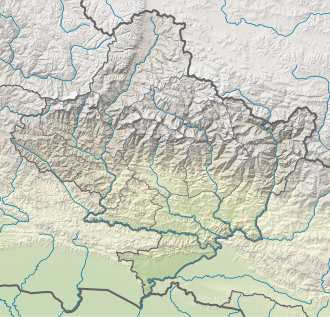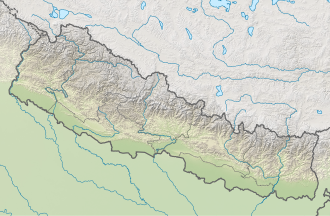Top Qs
Timeline
Chat
Perspective
Lo-Ghekar Damodarkunda Rural Municipality
Rural municipality in Gandaki Province, Nepal From Wikipedia, the free encyclopedia
Remove ads
Lo-Ghekar Damodarkunda (Nepali: लोकेघर दामोदरकुण्ड) (earlier:Dalome) is a rural municipality situated in Mustang District of Gandaki Province of Nepal.[1] The municipality is situated on the northern part of the Mustang, surrounded by Lomanthang rural municipality on the north, Barhagaun Muktichhetra on the south, Manang District on the south-east and Dolpa District on the west, while the north-eastern border of the rural municipality touches the border of Tibet in southwest China.
The total area of the rural municipality is 1,344 square kilometres (519 sq mi) and its population, according to the 2011 Nepal census, was 1423. The rural municipality is divided into 5 wards. The admin center of the rural municipality is at Charang.[2]
Charang, Surkhang and Dhami Village development committees were Incorporated while established this rural municipality.[2] The rural municipality came into existence on 10 March 2017, fulfilling the requirement of the new Constitution of Nepal 2015, Ministry of Federal Affairs and General Administration replaced all old VDCs and Municipalities into 753 new local level bodies.[3][4]
Remove ads
Demographics
At the time of the 2011 Nepal census, Lo-Ghekar Damodarkunda Rural Municipality had a population of 1,569. Of these, 69.1% spoke Lhopa, 23.1% Gurung, 3.5% Nepali, 1.6% Rai and 2.6% other languages as their first language.[5]
In terms of ethnicity/caste, 40.1% were Lhopa, 30.8% Chhetri, 23.3% Gurung, 1.2% Hill Brahmin, 0.8% Chhantyal, 0.8% Kulung, 0.8% Rai and 2.2% others.[6]
In terms of religion, 65.4% were Buddhist, 33.3% Hindu, 0.8% Kirati, 0.1% Bon, 0.1% Prakriti and 0.4% others.[7]
In terms of literacy, 44.6% could read and write, 2.7% could only read and 52.7% could neither read nor write.[8]
- Dalome
- Charang
- Charang Gompa
- Road Tsarang - Ghami
- Ghami
- Ghami wall
- Hotel in Zhaite
- Ghiling gompa
- Syangboche
Remove ads
References
Wikiwand - on
Seamless Wikipedia browsing. On steroids.
Remove ads












